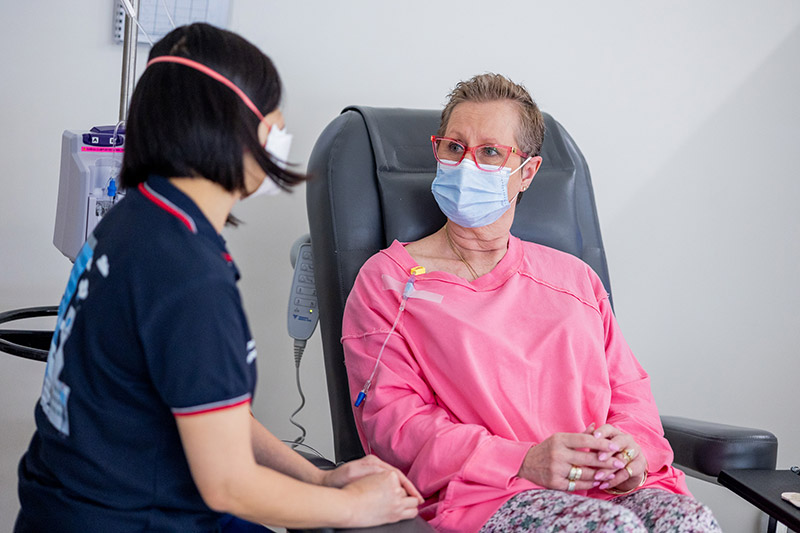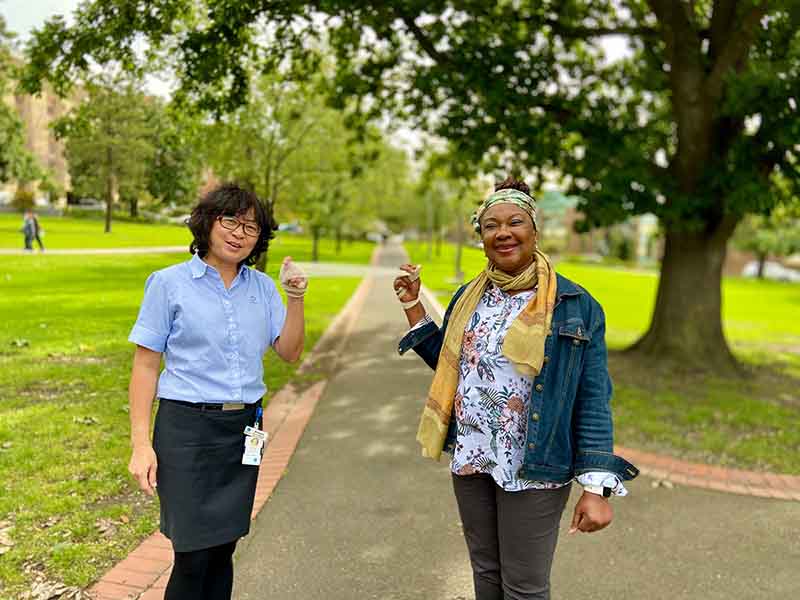Women's Health Unit at Epworth
Our Women's Health Unit team are highly skilled in the treatment and care of women with gynaecological cancers. The Medical Specialists, Gynaecological Clinical Nurse Consultant, Allied Health and Ward staff work closely with patients and families providing expertise, education, and support at this challenging and stressful time.-
What is cervical cancer?
Cervical cancer occurs when cells in the lining of the cervix grow abnormally and uncontrollably, most commonly starting in the transformation zone of the cervix.
There are two main types of cervical cancer: squamous cell carcinoma and adenocarcinoma.
Squamous cell carcinoma is the more common type of cervical cancer and starts in the skin-like cells of the cervix. At diagnosis, the cancer is often just within the cervix, but it may spread to tissues around the cervix (the vagina or lymph glands) or other parts of the body.
-
What increases the risk of cervical cancer?
- Human Papillomavirus (HPV)
The human papillomavirus (HPV) causes more than 99% of cervical cancers and is a common sexually transmitted virus that infects the squamous cells that line certain organs. Most sexually active people have HPV at some point in their life, but persistent infection can cause cervical, vaginal, and vulvar cancer. Fortunately, the HPV vaccine can reduce the risk of infection.
- Smoking and passive smoking
Smoking can cause local impairment of cell-mediated immunity in the transformation zone of the cervix, increasing the risk of cervical cancer.
- A weakened immune system
Women with a weakened immune system may not be able to clear the body of HPV. This includes women with the human immunodeficiency virus (HIV) and those taking medications that lower their immunity.
- Exposure to diethylstilbestrol (DES)
This manufactured form of oestrogen was used from the 1940s to 1970s to prevent miscarriage. Women whose pregnant mothers took DES have a small but increased risk of cervical clear cell adenocarcinoma, a rare type of cervical cancer.
- Human Papillomavirus (HPV)
-
Can you screen for cervical cancer?Yes, Australians have access to the National Cervical Screening Program. More accurate than the Pap smear, the cervical screening test is paving the way forward for prevention and reduction in cervical cancer diagnosis. Whether you identify as straight, gay, lesbian, bisexual, transgender or intersex, if you have a cervix you should have cervical screening at age 25, then every 5 years up to the age of 74.
High school cervical cancer vaccination
The Australian Federal Government offers eligible people (adolescents aged 9 – 18) the free HPV vaccine to reduce rate of HPV infection. The most common HPV vaccine protects against seven high-risk types of HPV known to cause 90% of cervical cancers. For women aged 25 and above, the best protection against cervical cancer is cervical screening every 5 years.
Signs and symptoms
It's natural and common for changes to occur to your body as you age and remember all changes aren't due to cancer. However, we encourage you to recognise what is normal for your body and if changes are persistent consult your GP for peace of mind.
Symptoms of cervical cancer:
- Abnormal vaginal bleeding or discharge, between periods, after menopause, or during or after sexual intercourse
- Back or pelvic pain or pressure
- A change to your usual vaginal discharge – more discharge, unusual smell or colour
- Heavier or longer periods than usual
- Changes in bowel or bladder habits such as constipation or urinary incontinence
Epworth fact sheet | Cervical cancer
Colposcopy Clinic at Epworth Freemasons
Diagnosis
Epworth uses a range of diagnostic tests to thoroughly investigate signs and symptoms of underlying health concerns.
Below is an overview of common tests used to diagnose cervical cancer.
Physical examination
Your GP or specialist may perform an exam called a colposcopy. This allows your doctor to view the tissue and any abnormal cells in the cervix and vagina.
Blood test
Your doctor may order several blood tests to check your overall health and to detect proteins produced by cancer cells. These proteins are called tumour markers.
Biopsy
Tissue samples are taken and looked at under a microscope to determine if cancer cells are present. Biopsies will be performed on the cervix via colposcopy.
CT scan
Computerised tomography (CT scan) uses X rays to compile three-dimensional pictures of the inside of your body to look for cancer in lymph nodes or other organs.
MRI scan
Magnetic resonance imaging (MRI scan) creates detailed cross-sectional pictures using magnet and radio waves.
PET-CT scan
Positron emission tomography (PET-CT scan) provides more detailed information by highlighting cancer cells which use more glucose than normal cells.
Staging - Investigating the extent of the cancer
During your initial diagnostic tests, your care team may be able to stage your cancer at the same time during a biopsy or CT, MRI, or PET scans.
What does my cancer stage mean?
Staging is a term used to describe the size of the cancer and whether it has spread. Staging helps your care team and specialists to create a unique treatment plan.
Stage 1
Early cancer where the tumour is found only in the tissue of the cervix.
Stage 2
Cancer has spread from the cervix to the upper two thirds of the vagina or other tissue nearby.
Stage 3
Cancer has spread to the lower third of the vagina and/or the tissue on the pelvic wall or to lymph nodes in the pelvis or abdomen or the urinary system.
Stage 4
Sometimes called advanced cancer, stage 4 means cancer has spread to the bladder or rectum (stage 4A) or beyond the pelvis to the lungs, liver or bones (stage 4B).
Find your Epworth gynaecological cancer specialist
View our gynaecologists and medical oncologists with a sub-specialty in gynaecological cancers (cervical, ovarian, uterine and vaginal and vulvar cancer).
Treatment
At Epworth, our specialised Gynaecology Cancer Centre will provide you with a team of experts who work together to create a treatment plan that considers your needs and circumstances.
Why choose Epworth for cancer care?
Epworth HealthCare is Victoria's largest not-for-profit private hospital group. As a not-for-profit, we use our revenue to reinvest in our people, training and facilities. This allows our hospitals to be renowned for excellence in cancer diagnosis, treatment, rehabilitation and care for our patients and their families.Treatment overview
Depending on the stage of your cancer, you may be recommended treatment for precancerous abnormalities, surgery, or a combination of chemotherapy and radiotherapy. Some cancers are cured with surgery alone and others require a combination of treatments.
- Cervical abnormality treatment
During diagnostic tests your doctor may discover abnormalities in your cervix that can be treated before cancer develops.- Large loop excision of the transformation zone (LLETZ)
LLETZ is the most common way of treating precancerous changes to the cervix. A thin wire loop is heated electrically and used to remove the abnormal tissue. - Laser surgery
A laser beam (hot light beam) is used to vaporise or remove the abnormal cells.
- Large loop excision of the transformation zone (LLETZ)
- Surgery
Surgery is first line treatment for cervical cancer that has not spread beyond the cervix. This would usually involve a total hysterectomy to remove the uterus and cervix.
Learn more
- Radiotherapy
Radiotherapy is the use of radiation (X-rays) to kill or injure cancer cells. Depending on the type and location of your cervical cancer, your treatment team may recommend radiotherapy.
Learn more
- Chemotherapy
Chemotherapy is a common form of treatment that involves the use of anti-cancer drugs to kill or slow the growth of cancer cells. Chemotherapy is often used alongside other treatments such as radiotherapy and surgery.
Learn more
Multidisciplinary Team (MDT) Assessment and Plan of Treatment
You will have access to an MDT to plan the management of your cancer. All members of the MDT have a special interest in gynaecological cancer, and include:
- Gynaecological oncologists
- Medical oncologists
- Gynaecologic clinical nurse specialists/oncology liaison nurse
- Gynaecologic histopathologists/cytologists
- Physiotherapists
- Radiologists
- Research staff
- Radiation oncologists
- Genetics counsellors
- Social workers
- Psychiatrist/psychologist
- Pastoral Care
Why choose Epworth to perform cancer surgery?
Our gynaecological oncologists perform more than 1,000 major gynaecological cancer operations each year. Epworth was the first private hospital group in Victoria to treat gynaecological cancers using robot-assisted surgery.
Types of cervical cancer surgery:
- Sentinel lymph node dissection
This procedure is performed to identify whether the cancer has spread from the cervix to the nearest lymph node. If this lymph node contains cancer cells, the surgeon may recommend chemo-radiation treatment instead of surgery, to stop the cancer spreading further through the body. - Trachelectomy
In rare cases, a trachelectomy to remove part or all of the cervix and upper vagina may be performed. This is not common but may be offered to young women with early-stage cancer who still wish to have children. - Radical hysterectomy
A radical hysterectomy, removing the uterus, cervix, soft tissue around the cervix, the top of the vagina and the fallopian tubes is the standard surgery for most cervical cancers. Some women may keep their ovaries, but not if there is concern that the cancer could have spread to the ovaries or for women who have been through or are approaching menopause.
Radiotherapy
Epworth oncologists use radiation to cure, control and reduce gynaecological cancer cells for our patients.
Radiotherapy at Epworth
Epworth offers patients radiotherapy through our provider, Icon. As Australia’s largest dedicated cancer care provider, Icon has a long history of delivering exceptional cancer care to the Australian community.
Supported by the latest world-class technology and evidence-based techniques, Icon’s highly experienced team of radiation oncologists, radiation therapists, physicists and nurses are committed to providing compassionate, exceptional care for patients and their loved ones.
What is radiotherapy?
Radiotherapy is the use of radiation to treat and manage cancer.
What are the side effects of radiotherapy?
Side effect types and duration will vary from person to person, some general side effects may include:
- Fatigue
- Skin irritation
- Feeling weak
- A stinging sensation when urinating
- Diarrhoea
Will I need radiotherapy?
Your oncologist will speak with you to decide whether radiotherapy is the right treatment option for you.
Chemotherapy
Your medical oncologist will oversee your chemotherapy. These specialists work closely with surgeons, radiation oncologists, physicians, nurses, and allied health professionals to ensure that all elements of your care are coordinated.
Your medical oncologist will explain and discuss current treatment recommendations and the opportunity to participate in appropriate clinical trials.
What is chemotherapy?
Chemotherapy is a common form of treatment that involves the use of anti-cancer drugs to attack cancer cells. Chemotherapy is often used alongside other treatments such as radiotherapy and surgery.
How will I receive my treatment?
The treatment can be given orally, through an intravenous cannula, direct introduction to the affected organ/tissue or as a cream. Chemotherapy is often given in courses or cycles with periods of rest in between, allowing normal cells to recover.
Are there different types of chemotherapy?
Yes, there are many different types of chemotherapy. Your care team will explain which chemotherapy is best for your circumstance.
Will I need chemotherapy?
If you have been diagnosed with gynaecological cancer, your Epworth oncologist will discuss with you if chemotherapy is suitable for your treatment needs.
What are the side effects of chemotherapy?
Our team is here to support you throughout your cancer journey and will help you prevent and manage these potential and often temporary side effects.
Side effects may include:
- Nausea and vomiting
- Diarrhoea or constipation
- Fatigue
- Hair loss
- Muscle weakness
- Skin sensitivity to sunlight
- Dry or tired eyes
- Loss of appetite
Epworth Wig salons
Head wear and wigs are offered to all Epworth patients experiencing hair loss at our convenient on-site salons. This service is provided via the generosity of our Epworth Medical Foundation donors so there is no cost to patients.
How do I prepare for chemotherapy?
- The Gynae Clinical Nurse Consultant and Oncology Liaison Nurse Consultant will provide education and a support pack for your information and explain the chemotherapy process.
- You may be able to use “cold caps” to prevent hair loss or may like to be fitted for a wig prior to starting chemotherapy in case you need it.
- Recovering from surgery, eating well, staying well hydrated, sleeping and exercising will all play a part in preparing for chemotherapy.
- You may choose to have your chemotherapy at one of Epworth’s Day Oncology Units or a unit closer to your home.
- If you have children or grandchildren from babies to age 18, you may like to read the Cancer Council book: Talking to Kids About Cancer. The ward team can provide a copy.
Epworth cancer care locations
Rehabilitation with Epworth
Cervical cancer locations:
Cervical cancer rehabilitation
Rehabilitation doesn't just start after your treatment has ended. You may benefit from our holistic rehabilitation programs at any time throughout your cancer journey. Our programs support you to physically and emotionally prepare for treatment or restore your strength and wellbeing.Overview
Epworth offers patients programs to support their wellbeing before, during and after treatment. We believe this approach allows our patients to feel best prepared for treatment or feel more like themselves following surgery or other medical interventions.Who is the program for?
Our cancer rehabilitation program is designed for anyone diagnosed with gynaecological cancer at any time from diagnosis to treatment and recovery.What does the cancer rehabilitation program involve?
Before you start
You will meet a rehabilitation doctor and allied health team for a medical, psychosocial, and physical assessment.
Everyone's cancer care journey is different. The assessments will help the team understand your specific needs to develop the right program for you. You will work with the team to develop goals to work towards throughout the program.
During the program
Depending on your assessment and individual needs, you may complete your program:
- as part of a group, with other people, who have been diagnosed with varying cancers
- on your own, one to one with the rehab team members.
A typical program may involve:
Most people will attend as an outpatient, coming to hospital for a few hours once or twice a week, over several weeks. Some people may need to stay overnight in hospital and complete a program over several consecutive days.
Either way, you will receive the same support from our team to address your physical, functional and emotional needs.
Your rehabilitation program may focus on the following:
- A physical exercise component to help restore movement, strength and fitness.
- An educational component where you will learn about different areas associated with your cancer diagnosis and treatment and how to manage them, including:
- fatigue
- pain
- emotional wellbeing
- body image and self-esteem
- work or family challenges
- relationships
- late-onset of side effects.
At the end of your program
Our rehabilitation team will keep in touch with your referring doctor and/or treating team throughout the program and will let them know how you went at the end.
They will also connect you to local services and support networks so you can leave the program with strength and confidence to live life to your fullest potential.
Who will support me during the rehabilitation program?
Depending on your needs, you may see some or all of our multidisciplinary team which includes:
- Rehabilitation specialist doctor
- Cancer nurse
- Exercise physiologist
- Physiotherapist
- Psychologist
- Social worker
- Occupational therapist
- Dietitian.
How can I access a rehabilitation program?
Referrals
A referral from your specialist or GP is required to participate.
Ask your doctor to complete the referral form at www.epworth.org.au/rehab and return it to us via fax: 03 9982 6696 or email: [email protected]
Locations
Group programs are located at Epworth Camberwell and Epworth Hawthorn.
Individual programs can be accessed at Epworth Brighton, Epworth Camberwell, Epworth Geelong, Epworth Hawthorn or Epworth Richmond Rehabilitation.
Contact us
If you have any questions about our cancer rehabilitation programs, call us on: 1300 345 600.
Life after treatment
Following treatment, you may feel excited, anxious or depressed. Life after cancer treatment can pose its own challenges but our Epworth specialists are here to support you.Life after cancer treatment can be a mixture of emotions. You may not 'bounce back' as quickly as you expected to, but be kind to yourself.
Remember that:
- You may still feel fatigued after finishing treatment.
- You may like to make an advanced care plan with the assistance of our social worker. We encourage you to speak with your care team to learn more.
- Ask for help. If your body has changed due to treatment, remember help is out there to support you to feel your best and regain your sense of identity and self-esteem.
- Speak with your care team about options to support your general wellbeing after treatment. The Cancer Council provide a free telephone intimacy counselling service (13 11 20) and your care team can also make referrals to sexual counsellors, menopause, fertility and lymphoedema experts.
Follow-up appointments
Epworth patients in remission for gynaecological cancer will have follow up appointments every three months, alternating between surgical and oncology specialists. This will also involve tumour marker blood tests and imaging, such as PET or CT scans.
Managing your health and wellbeing ongoing
Knowing how to best manage your wellbeing ongoing is an essential step toward recovery. We encourage people who have been living with cervical cancer to stay active, eat healthy foods, sleep well and enjoy your post treatment life.
You may like to explore different ways to relax, such as meditation, yoga or massage.
The Memorial Sloan Kettering Cancer Centre (New York) website has many useful online videos about adjusting to life after cancer, with useful dietary and lifestyle advice.
Find your Epworth gynaecological cancer specialist
View our gynaecologists and medical oncologists with a sub-specialty in gynaecological cancers (cervical, ovarian, uterine and vaginal and vulvar cancer).


